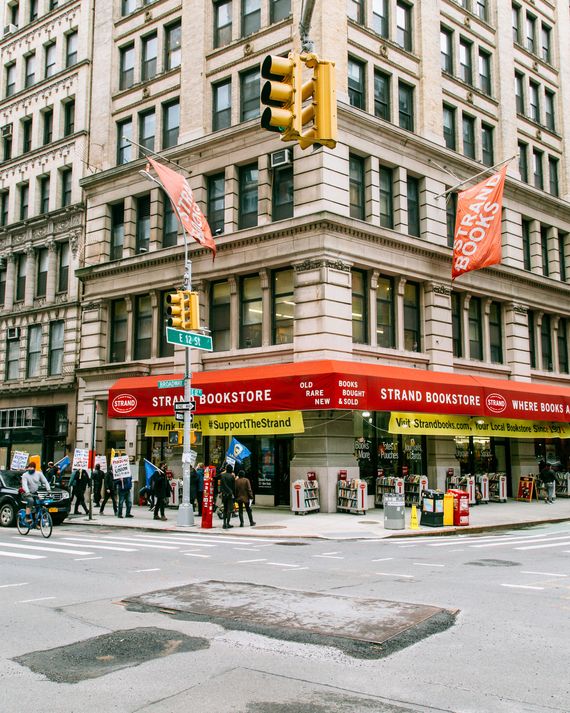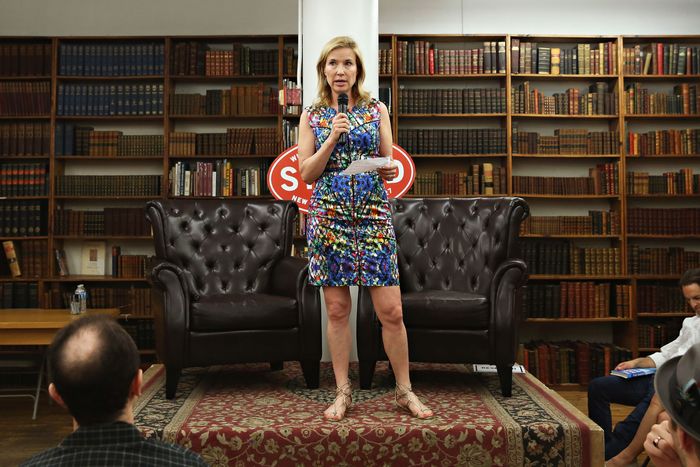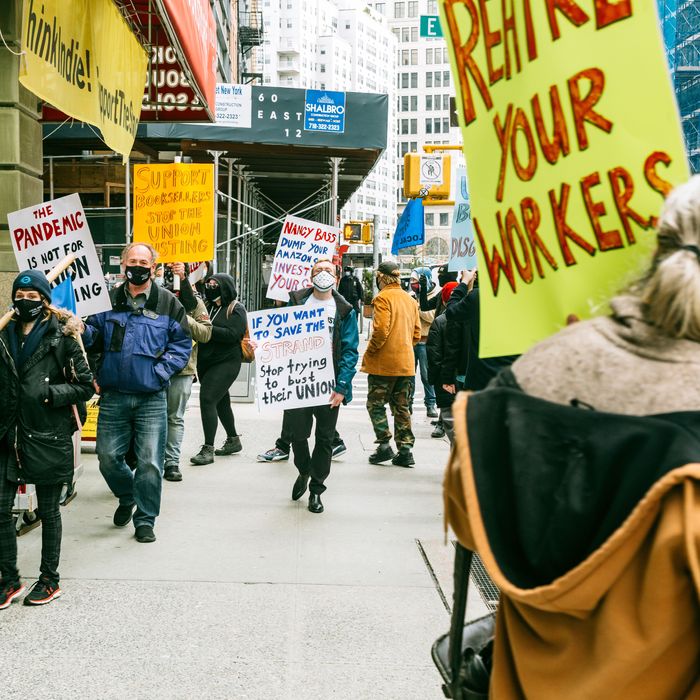
When Robyn Smith started working as a bookseller at the Strand in 2019, she felt like she’d found her people. She loved having co-workers who were almost too passionate about books. She loved how, when she later joined the events team, she got to pose questions to famous authors, like what animal they’d choose to ride into battle. (André Aciman opted for a chameleon.)
“I saw the Strand as a place of comfort within the city,” Smith said. “Being a part of that team is really special. I felt special coming to work every day.”
The Strand, with its flagship on Broadway and on East 12th Street, is the city’s most iconic bookstore. For a certain kind of New Yorker, it’s an equally iconic place to work — one where job applicants have to take a literature quiz matching books’ titles with the corresponding author’s names to prove their chops. Luc Sante worked there. Patti Smith too, for a hot minute. (She found it unfriendly.) Strand employees are expected to have opinions. One former manager, Theresa Buchheister, recounted what happened when a friend of hers asked a staffer to help find a copy of John Updike’s collected Rabbit novels. The staffer groaned. “You don’t like Updike?” the customer asked. “I don’t like … collections,” the staffer replied. Pretentious, sure, sometimes, but these are people who take pride in what they read and in what they recommend. The job came with its own set of problems, like working long hours in a creaky, quirky old building rife with creaky, quirky old building problems, and the usual conflicts between workers and the boss. Still, employees say the actual work of bookselling, and the community around the store, mostly outweighed the bad.
That precarious balance came undone last year as the pandemic ravaged the retail industry. When the state closed all nonessential businesses in late March 2020, a week after the Strand had shuttered its doors as a precaution, Robyn Smith and 187 of her colleagues were laid off. The store remained in hibernation until the end of June, when management brought back a skeleton crew. Since then the Strand and its unionized workers have been locked in a struggle over money, priorities, and safety. In interviews over the last five months, Strand employees told Vulture that they recognize bookstores are struggling right now — but many of them still don’t think the Strand’s owner, Nancy Bass Wyden, is taking their well-being into account. Employees have accused their boss of flouting COVID safety precautions and taking a PPP loan meant to help people keep their jobs without rehiring enough people or explaining where the money went. Last July, the union filed a grievance, saying managers were doing union work.
The Strand has pushed back on many of its employees’ claims. This week, a spokesperson told Vulture that the store has taken all the necessary precautions for COVID safety and been responsive to employee feedback. It would also “literally be impossible” to rehire everyone, the spokesperson said: “The limited sales we make now plus the PPP loan are the only things keeping our staff paid. So until in-store sales bounce back, this is the best we can do.”
Despite a recent arbitration meeting and months of conversations, nothing has been resolved. At the beginning of this month, the union organized a demonstration outside the Broadway store’s entrance; employees marched and hoisted signs. On Instagram, union members circulated a post urging customers to call the Strand and “tell Nancy Bass Wyden that you will not support union busting.” Will Bobrowski, a union shop steward who has worked at the Strand for 18 years, said the arbitration is a first for him: In the past, “we would argue and somebody would be unhappy coming out of it … but we would settle our shit.”
The Strand, with its four retail floors and its claimed “18 miles of books,” is a collector’s paradise. A nerd’s sanctuary. A place where staff take pride in knowing their stuff and imparting that wisdom to shoppers. The past year, though, has laid bare just how perilous a job you like, or even love, can be when you’re working without the most basic of safety nets. This fragility is something that Strand employees have always known — they work in retail, after all. Before, though, the job had just enough perks, just enough meaning, to make it worth the struggle. In that way, working at the Strand was like a microcosm of living in New York, a city that absolutely does not need you. Without all the good, the bad takes on new weight.
Nancy Bass Wyden is the third generation of her family to run the store, which her grandfather, Benjamin Bass, founded in 1927, in a pocket of Manhattan then known as “Book Row,” which stretched along Fourth Avenue between 8th and 14th Streets. He was known to sleep on a cot in the store during the early, lean years. His son, Fred, got his start in the family business young, joining his father at age 13. Fred Bass bought the Strand’s current building, on Broadway, for $8.2 million in 1996. The store has historically rented various floors of the building to other tenants as a revenue stream; otherwise, it stays afloat by buying and selling new and used books, hosting events, and, of course, selling its branded tote bags — a product much-maligned by the store’s bookish staff. The building was landmarked in 2019, against Bass Wyden’s wishes; she described landmarking as a “bureaucratic straitjacket.”
Clashes between employees and the store’s management aren’t a uniquely 2020 problem. Stories of struggles between the Basses and their staff have circulated for years. The union — which represents all employees save for managers, part-timers, and workers still on probation — was founded in the 1970s, and has been active ever since. There was even a blog called “I Hate the Strand” in the mid-aughts, apparently maintained by a disgruntled employee. Will Bobrowski describes the late Fred Bass as equally “generous” and “a pain in the ass at the bargaining table.” Still, employees mostly respected him for his deep, borderline obsessive love of books and of his business. “He knew his people,” Bobrowski said. “If you’d been there for a year, he knew your name. He knew what you did.”
By contrast, there’s a story Strand employees like to tell about Nancy Bass Wyden, one I heard versions of over and over from both former and current employees (and which the Strand spokesperson denied). Legend has it that 20-odd years ago, a hotshot actor was walking around the Strand. Bass Wyden, who was then the co-owner with her father, clocked him as someone and started asking her employees if they could identify him. “Holden Caulfield,” a staff member with a particularly dry sense of humor told her. Bass Wyden then turned around and told everyone she could find that the one and only Holden Caulfield was shopping in her store.
It’s not clear if any of this ever happened, although it’s safe to say that a fictional J.D. Salinger character has never shown up at the Strand. The anecdote does distill how many employees feel about Bass Wyden: She’s not one of them. Which likely wouldn’t matter, if an apparent lack of bibliophilia wasn’t coupled with being what was described by one former employee as “deeply out of touch.”
Past and current workers describe Bass Wyden as the kind of boss with a habit of arbitrarily moving books and merchandise from table to table, making it difficult to locate items in the Strand’s computer system and actually sell them. The kind of boss who would come to check on the Strand’s booth at an outdoor holiday market in Bryant Park but leave after ten minutes, announcing she was cold. (Also cold: the employee working in the booth for hours.) The Strand spokesperson pushed back on these claims, saying that the booths were heated and disputing that there was anything unusual about the way Bass Wyden organized merchandise.
And then there was “the thing with the sprinklers.” In 2013, the shop was reported to be weaponizing its sprinkler system to forcibly remove people sleeping outside the store by dousing them with cold water. A manager at the time said they were just trying to clean the sidewalks; Bass Wyden, then co-owner of the store, said only that she was “not sure” why the sprinklers were being used. Whether the strategy was hers or not, it’s become a permanent part of her reputation among employees.
The other side of this, of course, is that Bass Wyden has thus far been able to do the near impossible: She’s kept a relatively large, independent, unionized bookstore alive in the age of Amazon. Part of that could be due to the Strand’s enduring mythos. It’s the kind of place that lures in employees who will work their damndest to make sure it remains open; some employees feel the store succeeds in spite of its owner. But in the end, it is still Bass Wyden’s business, one that she says it’s “honestly a miracle that we’re still operating” during the pandemic. In 2014, Bass Wyden told Vulture 15 percent of the store’s revenue was then coming from merchandise, a revenue stream fully realized under her leadership. Still, there’s some irony, a former staffer said, in a store that sells Ruth Bader Ginsburg and Michelle Obama tote bags “out the yang” but doesn’t practice the same progressive values from which it profits.
Last spring, a few weeks after the mass layoffs, the Strand was approved for between $1 and $2 million as part of the federal government’s Paycheck Protection Program, reporting 212 employees (a 2019 figure) on its loan application. This loan would come to frustrate some recently laid-off Strand employees — not because the Strand collected PPP, which Bobrowski noted was a good thing, but because so few people were rehired when the store reopened. Since reopening, the store has never employed more than around 100 people, and Bobrowski said that staff requests for more clarity about how exactly the loan was used have gone mostly unanswered, aside from “vague statements about, ‘Well, it’s going to payroll.’” (The Strand says it also went toward rent.) When the Strand opened a new, smaller location on the Upper West Side in July, laid-off union members protested outside the store, holding signs that said, “Whose paycheck was protected?” and “Let Nancy eat cake!”
More frustrating to past and present employees was their boss’s personal stock purchases during this time. Bass Wyden is married to U.S. Senator Ron Wyden of Oregon, who helped author the CARES Act and co-sponsored legislation demanding more transparency from businesses that received PPP loans. Wyden’s job means that the couple’s investments are public, and Strand employees discovered that, between April and September 2020, Bass Wyden personally spent millions of dollars investing in companies including Google, Netflix, Exxon Mobil, Apple, Microsoft, and, most notably, Amazon — a company whose enticing subsides she had denounced in a January 2019 op-ed, when Amazon was attempting to build a new headquarters in Queens. “I have a message for politicians everywhere,” wrote Bass Wyden. “It’s time to stop bending over backwards for Big Tech and time to start listening to local businesses, which have been critical to growing our cities — and our country.” Exactly how much Bass Wyden invested in Amazon in 2020 is unclear because U.S. Senate financial disclosures offer dollar ranges, instead of exact sums: Last year, she made 11 stock purchases totaling between $235,011 and $650,000.
“As a small business owner trying to maintain operations during difficult times, it was necessary for [Bass Wyden] to diversify her investments,” a spokesperson for the Strand says. “With the Strand faltering, she wanted to ensure she had the resources to keep the Strand going.”
“To have our staff be overwhelmed during this pandemic where it’s so hard to keep us safe — all of them knowing she basically just said, ‘What’s the best investment, morals be damned,’” said Brett Bates, a union shop steward with Bobrowski. “It was infuriating, even if it’s predictable.”
In October, these tensions rose to the surface. Late that month, Bass Wyden used the Strand’s Twitter account to put out a call for help. “Because of the impact of COVID-19, we cannot survive the huge decline in foot-traffic, a near complete loss of tourism, and zero in-store events,” Bass Wyden wrote in her letter. She said the Strand’s revenue — which includes both the Broadway store, and the new Upper West Side location — had dropped 70 percent compared to 2019 and asked Strand lovers to bolster the bookstore’s dwindling coffers: “Shop Early and Shop Local!”
Former Strand employees quickly started counter messaging. “Please help me close down this awful, unethical institution by forgoing any assistance to them whatsoever,” tweeted Joseph McNamara Hefner, who worked at the store in 2015. “Sincerely, A Former Strand Employee Who Used To Cry In The Bathroom.” Another former employee, Rivka Holler, tweeted a lengthy thread of scenarios she alleges she and her colleagues faced: a roach-filled breakroom, a rotting rat lodged in a heat pipe, a flood and an (accidental) manhole explosion, both of which she says employees had to clean up without adequate protective equipment.
But it didn’t stop Bass Wyden’s “Save the Strand” message from going viral. (It’s now been retweeted nearly 25,000 times.) The next day, people lined up down the block on East 12th Street so they could shop in-store, spilling from under the Strand’s bright-red awnings down to Fourth Avenue. Bates says that he and other workers struggled to control store occupancy by stopping customers at the door — a COVID precaution — while Bass Wyden was hustling them in. “At one point,” he says, “Nancy led customers through the back freight entrance so that they would not be picked up by the occupancy counter.”
Bass Wyden would later tell the Washington Post that on a typical day the Strand might get 300 online orders. The weekend after she posted the letter, the store got 25,000. The website crashed. Customers spent $170,550 in two days, enough to cover a little more than half the losses Bass Wyden said the store posted in September. To help handle the increase, Strand employees scrapped vacations and came in on their off days, she told the New York Times, in an optimistic story headlined “The Strand Calls for Help, and Book Lovers Answer.” Bass Wyden never addressed the complaints from former employees.
It took weeks to get through all the internet orders placed after Bass Wyden’s letter, which overwhelmed the now-small staff; Bates says some union staffers were brought back explicitly to help tackle them. Three days after the Strand’s call for help, though, two new faces were spotted working in the shipping department: One was Bass Wyden’s teenage daughter. The other was the family nanny. The staff complained to management — there were still plenty of union members who were out of a job — and the nanny was removed, though he reappeared to work in the store several more times throughout the season, each time prompting further complaints.
Still, the October sales boost was something for employees to feel hopeful about. “We have people who were laid off who have families to support, who are in their 40s and 50s and lost their health insurance. The goal is to get them their jobs back … in order to do that, the store has to make a lot of money,” said Bates. “That’s the premise we have to work on … whether or not we know Nancy could secretly afford it.”
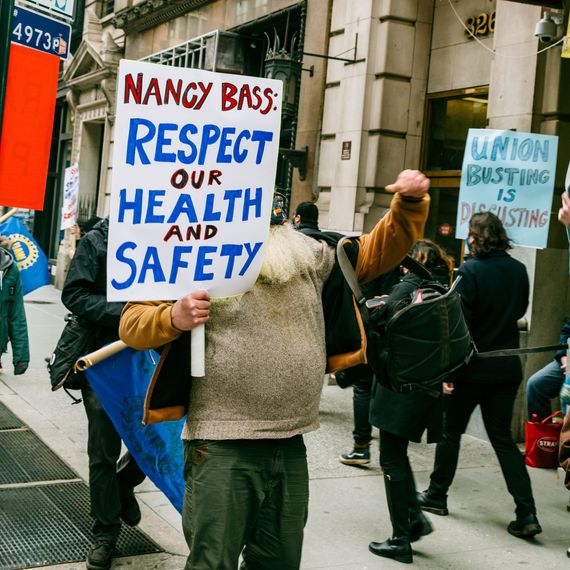
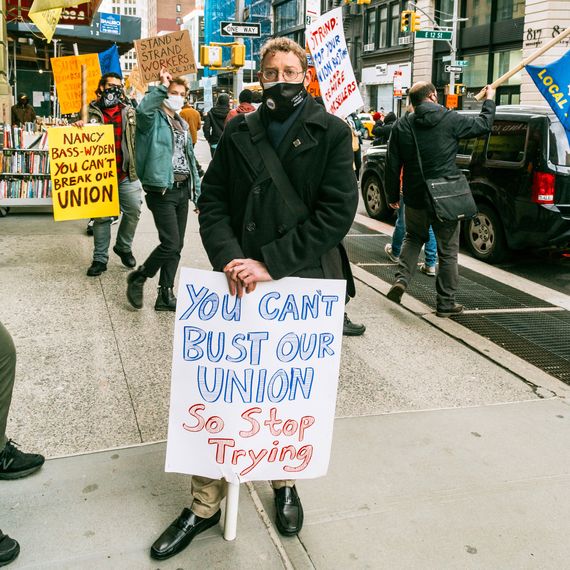
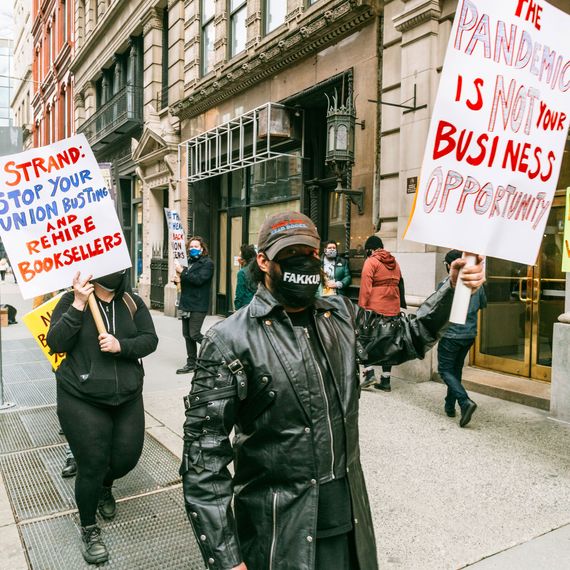
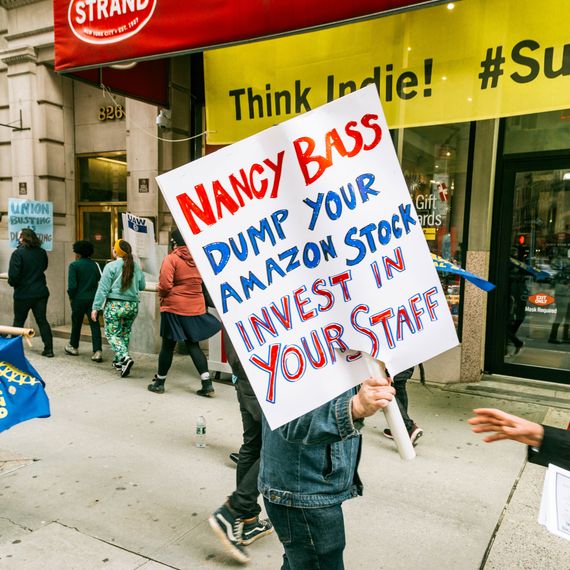
In the months since then, employees say the situation has not improved. Spirits at the Strand are crushingly low. “It was an anemic in-store Christmas, but I think everyone in the world knows that’s the truth of retail this year,” said Bobrowski. Most of the staffers who were rehired to handle the holiday rush once again had no jobs after Christmas — a common retail practice, albeit one that feels especially painful now. Earlier in the pandemic, a reminder to “please wear a mask” was played regularly over the store’s PA; it was suddenly stopped one day. One employee says it was discontinued because Bass Wyden thought it didn’t make for a “welcoming environment”; management told Vulture it was a technical issue. The Strand’s spokesperson said that several employees had tested positive for COVID over the past months, and that none of them were hospitalized or died from COVID-related complications. They also said that the store had followed quarantine and cleaning protocols and that they didn’t believe the employees had contracted the coronavirus while working at the Strand.
A year after the layoffs, there are still only 68 employees, around a third of what there were before the pandemic. “If I could bring back a staff 212 strong I would,” wrote Bass Wyden in a statement to Vulture. “But as the pandemic rages on we have to be strategic about our staffing levels and resource allocation so we survive in the long run.” By the beginning of the year, rumors had begun to circulate that the store would soon close. Robyn Smith said that the Strand’s HR department reached out to her in the fall with an offer to rehire her to work the holiday season — and a warning that the store might not survive past February. Another staffer said that toward the end of 2020, Bass Wyden mused to them that the store might not make it to March. (Bass Wyden said that she does not remember saying this; the store’s spokesperson said that the Strand only communicated to Smith that its future was unpredictable.)
Meanwhile, many businesses’ PPP loans have dried up. Bookstores across the country have been forced to turn to crowdfunding to stay afloat, and there’s a growing list of stores that didn’t make it. This week, the Strand’s spokesperson said the store’s business was “still down 70 to 80 percent, depending on the month.” The stakes are high: The Strand’s longevity is part of what makes it so important. “There’s a point at which the scale of it, that quantitative difference, becomes a qualitative difference, knowing that you could go in there and probably find something by any poet that you’re looking for,” said Benjamin Friedman, a bookseller who co-owns the independent bookstores Aeon and Topos. Without the Strand, just about your only option around what was once the literary center of New York would be Barnes and Noble.
For the Strand’s employees, the point of speaking out about the bookstore’s management isn’t to run the business into the ground, but rather to hold Bass Wyden accountable and try to make the place even just marginally better. I asked one former employee, who wanted to remain anonymous, what their ideal situation would be. “Imagine if the Strand was cooperatively owned,” they said. “I know that’s a pipe dream, but the people who work there are so passionate and so knowledgeable that it could really be the mecca that it is made out to be.”
“During the Save the Strand campaign, I worked the registers for a lot of that time. People were genuinely emotional. They would pile books on the counters. They would say, ‘I’m buying everything I can. Please tell me you guys aren’t going to close,’” said another employee, Jody, who asked we not use her real name. “It can be painful to live inside the contradiction of being treated badly by such a beloved place of business.” She says she never tells anybody not to shop at the Strand, “but I don’t have a lot of hope for the future of the store under [Bass Wyden’s] stewardship.”
In February, Jody quit. She doesn’t have another job lined up. A self-described former Strand diehard, she’d finally had enough. Enough of feeling she was more worried about her safety than her boss was. Enough of seeing a daily staff schedule with so few names on it that going to the bathroom during work was like a “national emergency.” Enough of that one customer, who, in her final days, criticized her at length for setting his change on the counter, rather than directly into his bare palm. She told me she’s not the only recent departure motivated by long-brewing frustration.
Even though she no longer works at the Strand, Jody attended this month’s demonstration in solidarity. There, she said, she saw an unidentified man in a cowboy hat yelling at the staffers on the street: “You’re making it harder for her [Bass Wyden]! You’re making it impossible to run this business!”
“We all just started laughing. We were like, ‘Man, it’s the opposite,’” Jody says. “‘We want people to be able to work there.’”


